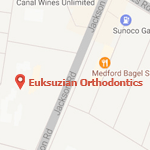25 Feb So I Just Got Braces – Now What?
Once you’ve decided to improve your smile with braces, it’s important that you know what to expect so you can keep your treatment on track. When you first have braces placed on your teeth, you will go through an adjustment period as you get used to the feeling of wearing them and knowing how to eat, brush, and floss your teeth.
Here is an overview of what to expect while wearing braces so that your time spent wearing braces is stress and problem-free time as you progress through treatment on the journey to your brand new, healthy and beautiful smile.
Week 1
Because force is being placed on your teeth in order to move them, you will likely experience sore teeth for a few days after the braces are first placed and occasionally after routine orthodontic visits. Anti-inflammatory medications like ibuprofen (Advil, Motrin, etc) are effective at reducing the soreness. You should also avoid eating hard and chewy foods when your teeth are sore.
It is also common during the first week for your lips, cheeks and tongue to become irritated as they get used to your braces. If you feel any discomfort from your braces rubbing against these areas of your mouth, you can place small pieces of dental wax over the parts of your braces that are causing the discomfort. After the first week, your lips, cheeks, and tongue will “toughen up” and become used to the braces.
Plan on eating mostly soft foods during your first week in braces. As a general rule, avoid eating anything that’s harder than a pretzel. You should also avoid foods like:
- Breads with hard crusts
- Nuts
- Bagels
- Raw vegetables
- Whole fruit
- Candy
- Any other hard, chewy or crunchy foods that can damage or break your braces
Stock up on foods like mashed potatoes, soups, yogurt, smoothies, cottage cheese, soft fruits, etc. so you have plenty of foods from which to choose.
Week 2
You won’t notice your braces as much by the second week. Even though you may not feel discomfort when eating, it’s important to avoid all foods considered “braces breakers” like the foods mentioned above. Just stick to the list of foods we gave you when your braces were put on so you don’t have any problems like loose or broken brackets and wires.
Week 3 and Beyond
Most people get completely used to wearing braces after a week or two. It is common to occasionally feel as though your teeth are loose when wearing braces. However, this sensation is normal as your teeth are slowly and gradually moving into their new positions.
Oral Hygiene is More Important Than Ever When Wearing Braces!
It’s very important to practice good oral hygiene while wearing braces as food particles and plaque can hide behind all the nooks and crannies of your braces. Arming yourself with the right tools can help you take good care of your teeth and braces. We recommend using a soft bristled toothbrush, fluoride toothpaste, and a reusable floss threader for flossing your teeth before going to bed each evening. An interdental toothbrush (Proxabrush) is another aid you can use to keep your teeth, braces and gums clean and healthy. An antiseptic mouth rinse such as Peroxyl is also something we recommend using as it helps control minor gum inflammation and irritation caused by your braces.
If you have any questions, please don’t hesitate to contact our Medford, NJ orthodontic practice; we’re always happy to speak with you!


